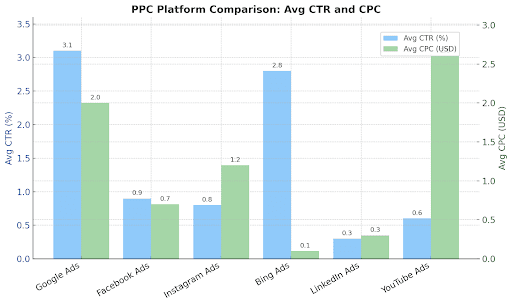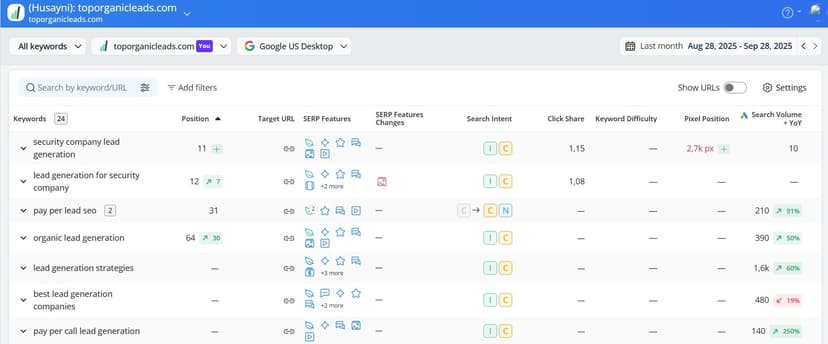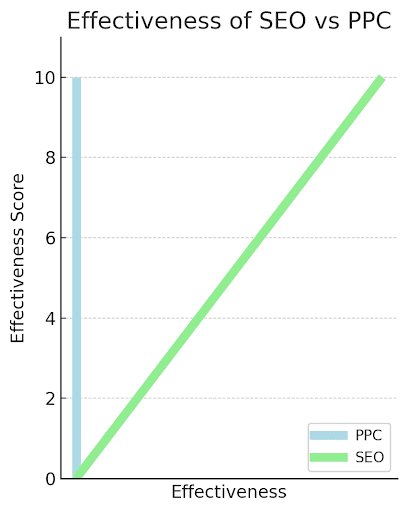Lead Generation through Paid Ads (Pay-Per-Click)
Can you spend a few dollars on a few ads? That might give you plenty of customers…
August 19th, 2025
9 min read
Glossary
| Term | Full Form | Meaning |
|---|---|---|
| PPC | Pay-Per-Click | A type of digital advertising where businesses pay a fee each time someone clicks on their ad |
| CPC | Cost-Per-Click | The amount you pay each time someone clicks on your online ad in a Pay-Per-Click (PPC) campaign. |
| CTR | Click-Trough Rate | How often people click your ad |
| CVR | Conversion Rate | The percentage of users who take a desired action on your website or ad campaign out of the total number of visitors. |
| Ad copy | - | The written text in an advertisement |
All businesses need leads, but sometimes you just desperately need leads, you know what I’m saying, right?
You can always go to paid ads. You know that right?
No one underestimates the power of the Internet in generating leads, but they mostly overlook the complex process required to generate sales online. This process needs a great deal of time, energy, and financial investment.
An option that’s been around for almost thirty years is paying only for the clicks you get. Every small business that wants to compete and get exposure can use an ad system. Google ads consist of search result ads and YouTube ads. It’s pay-per-click, so you agree to pay an amount, whether dynamic or fixed.
What Is Pay-Per-Click (PPC)?
Pay-Per-Click is any kind of advertisement where you only pay for the clicks (to your website) that you get. It can happen on any online advertising channel: Google, Facebook, Instagram, Bing, LinkedIn, and YouTube. There’s a great opportunity in that users are actively searching for a product or service on these platforms, so your ad is only shown to those who are interested in your business, services or products.
PPC is a real auction. In Google and Bing ads, business owners bid on specific keywords in a particular geographical area. Altogether, the agreed cost-per-click and the quality score of your ads will determine which ad is prioritized.
What you pay is for the clicks you get, nothing more, nothing less. But there are a couple of things you need to remember; first, if you hire a company to manage your PPC campaign, you will pay for the clicks you get plus the company’s fees. Second, not every click is a real customer; there might be a high chance that they don't even convert. We’ll talk more about that later.
Why Should I Care About PPC?
I see you’re intrigued, cool! Let me say PPC isn’t for anyone. Because there are a variety of methods to generate leads, you must pick the ones that suit you the best (or a combination of different campaigns). Now, how can one say they need PPC? Here’s a list you might find useful:
-
If you need traffic right now … As opposed to white-hat SEO, PPC doesn't take a few weeks to lead to results. So, if you’re in some sort of urgency or your SEO hasn’t matured yet, you might give PPC a try.
-
If you’re in a competitive market … Ranking #1 in Google organic search results is usually difficult - specially in a very competitive market. (If we determine that SEO is going to take some time, we may suggest you start with a quick PPC campaign.
-
If you want to test a new product or service … PPC is excellent for testing headlines, offers, or new markets. You can A/B test different copies and keywords without waiting weeks to get organic traffic.
-
If you need immediate leads on top of your current organic leads … Organic leads are not always steady and sometimes the market is slow. On these occasions you can start your PPC campaign as long as you generate some quality leads so your operations team is not standing idle. You can then turn it off when enough organic leads start to flow.
-
If youy want to maximize market share … Are you the most ambitious entrepreneur in your area? Why not maximize the number of leads you can get by investing in organic AND PPC (and any other marketing platform you can get your hands on). The sky is the limit when it comes to marketing and advertising, however, make sure you ask about our Marketing Attribution Software (MAS) to semi-percisely analyze your different campaigns ROI’s.
How Much PPC Costs
It depends on your market competition, site’s conversion rate (CVR) and a few other factors.
Let’s give an example, shall we?
Imagine you’re running an ad campaign for your home services business. Your budget is $15 per day, and your CPC is $3. That means you get five clicks a day. If your site’s Conversion Rate (CVR) is 1% (which is very low, I hope yours is not like that), it means you’ll probably get a customer every 20 days. Of course, if your CVR was higher, you would convert a lead much faster. For instance, if your CVR is 5% under the same assumptions, you would get a lead in four days.
Under the same circumstances, let’s assume that one of your competitors decides to over-bid you, within a few days, the cost/click could go up to $15 (instead of $3); now it takes five times longer and five times more expensive for you to get a lead.
So, do you see how altering different variables affects your campaign? That’s why we can’t specify an amount for ads; it’s different for each industry, each market. Here’s a list of things that can affect your CPC:
-
Keywords Competition: The higher the competition for a keyword, the more expensive bids become.
-
Time/Day/Location: These elements can raise or lower the CPC.
-
Ad Relevance: The higher quality in your ad decreases CPC. It’s even possible that you pay less than your competitor but get a better ranking, because Google considers many factors alongside the bid, including ad quality.
-
Industry: Some fields of work have higher CPC’s. Industries like finance, law, and insurance are more expensive.
What Platforms Are The Best for PPC?
You can advertise on different online platforms with PPC. The medium you choose is a strategic decision that depends on your field of work.
Here’s a comparison among different platforms used for PPC:

What Are The Components of A PPC Campaign?
To succeed in an ad campaign, there are a lot of details to consider. Here’s a list of components required for your ad campaign:
-
Intent: It’s important to see what type of searches lead to clicks. When people search on Google or other platforms, they either intend to learn something or make a purchase. The first kind of searches usually don’t result in a lead. This specifies a lot of keywords for you.
For instance, if I want to learn about different kinds of manicure, I’ll search for "best manicure types”, but if I want to make a purchase, I’ll search for “nail salons in Los Angeles”. Now, as a manicurist, I need to remember that when optimizing my campaign.
-
Keywords: How do people find you on the internet? They mostly search for keywords in your industry. You need to find the keywords that match what you offer the most.
For instance, you might provide deep cleaning for kitchen equipment and include pressure washing as one of your services. Now, pressure washing isn’t only used in your area of work. For instance, businesses cleaning rooftops also use it. That’s why the better keyword is "kitchen equipment cleaning" instead of "pressure washing". It's a better choice because this keyword directly relates to your primary services.
-
Volume: A keyword’s volume shows how much a particular keyword is searched for on the Internet. This way, you can choose keywords with high volume (or low volume for better targeting).
-
Budget: Something important in PPC is the amount of money you spend on ads. Don’t expect much growth if you don’t invest enough money. To be the No. 1 in search results rankings, you need to overbid your competitors.
-
Ad Quality: This is a significant factor in PPC and affects many other factors directly. When the ad quality is high, you pay less per click compared to your competitors.
There are many factors that help an ad to have a higher ad quality score. For instance, using compelling keywords in the ad copy itself.
 This is an ad copy.
This is an ad copy.
-
Landing Page Quality: The quality of your landing page affects the conversion rate (CVR). A visually appealing landing page with accurate and adequate data converts more leads and increases your ROI.
-
Offer: What makes visitors stay, scroll, and click on your landing page? Yes, a high-quality landing page is effective, but let’s use another tool too. Offers such as “free consultation” and “free estimation” provoke customers to stay and take action.
Partner up with us to make new leads!
Call now to consult with our digital marketing experts.
How Should I Manage A PPC Campaign?
- Check Search query reports (SQRs): Search query reports give us a breakdown of the phrases that have triggered the ads. It finds pockets that profit and lets you put money in them.


-
Eliminate negative keywords: When some keywords show up in someone’s query, they most probably don’t want to make a purchase. For example, if someone searches for “free esl classes”, they most definitely don’t want to pay for these classes. So, you don’t want to include “free” in your keywords. Even more, you want to eliminate this keyword. Thankfully, you have such an opportunity when setting up ad campaigns. This setting filters irrelevant clicks.
-
Evaluate Your Site’s Conversion Rate (CVR): Your site’s CVR tells a lot about the quality of your landing page. If the CVR is very low, you might need to rebuild your website. How to make sure? Well, you have to design another landing page with different components and do A/B tests to ensure the problem is your landing page (trust me, it usually is).
-
Split Tests: The only way to learn how an ad campaign works is by testing. You might need to initiate ad groups and run multiple ads to see which ones are working best.
-
Optimize for Different Devices: Surprising, right? CVR might differ from a mobile device to a desktop. If the mobile traffic is less than the desktop traffic or otherwise, you’ll have to eliminate the particular traffic that isn’t helpful.
-
Optimize for Times of The Day/Days of the Week: As strange as it is, your traffic might be more during specific hours and days. That’s why you should eliminate the other hours and days from your campaign. A common example of that is for businesses that don’t work on weekends. If there’s no operator to receive incoming calls or follow up on the new leads, what’s the point of running ads on weekends?
On the other hand, this may be a great opportunity for you, because your ad competition will be lower on the weekends and you can increase your ROI if you run ads on the weekends.
PPC - Pros & Cons
Like any other lead generation strategy, PPC has its own attributes that can be beneficial or harmful depending on your situation. Here’s a list of pros and cons of PPC. Let’s evaluate it together.
PROs:
-
Speed: Unlike SEO, PPC brings traffic instantly. You run the campaign today, and today, you have leads.
-
Targeted reach: In your ad campaign, you can specify demographics, location, interests, and device type. So it gives you more control over the target audience.
-
Control: You can manage the budget and schedule, and do all the adjustments just the way you want. You can even play with the settings just to see what happens. (If you have dollars to set on fire, why not?)
-
Data: Ads gives you access to data that will help you with testing and optimization. You can see which keywords work best for your business.
CONs
-
Price: If you have a highly competitive industry or if you manage your campaign poorly, ads can get expensive for you. You must keep an eye out for your ROI, which is an acceptable number.
In our experience with clients, cost per lead with ads are much higher than cost per organic leads.
-
Continuous Optimization: When running ad campaigns, you need to consistently optimize bids, keywords, and ad copy; otherwise, your campaign is worthless.
-
Quality of Leads: Lead quality could be lower with PPC campaigns. As a matter of fact over 70% of people ignore “sponsored” listings on Google.
Research also shows that people don’t trust companies that run ads as much as they trust companies that organically show up on Google organic search results.
-
Click Fraud: Sometimes competitors or bots click on your ads. These clicks don’t result in leads; they’re just a waste of your budget. Better hope you don’t have competitors like that.
There are companies who can help you block these IP addresses automatically. However, you pay for the click the first time anyways and that’s one reason cost per lead goes higher with ads compared to organic leads.
-
Short-term Results:
There are no actual long-term results for ad campaigns. Once you stop funding the campaign, the leads are gone; unlike SEO, which builds over time, and the results are everlasting (as long as you continue your SEO campaigns).
Which One Is Better? Paid Ads or Organic Results?
It actually depends on your services and field of work. We generally advise both SEO and PPC, because it takes longer for SEO to have its full effect. You might need to run ad campaigns alongside to have some leads while working on SEO. But remember, having PPC doesn't make SEO unnecessary. Here’s a comparison of these two lead generation methods:
| PPC | SEO | |
|---|---|---|
| Cost | Pay Per Click | Pay Per Lead |
| Sustainability | Ends When Budget Ends | Builds Over Time |
| Speed | Immediate | Long-Term |
| Control | High | Low |
| ROI | Short-Term | Long-Term |
In the graph below, you can see the effectiveness and sustainability of PPC campaigns and SEO services:

Once you pay for PPC, you get leads immediately. The results are not everlasting, though. If you stop financing the ads, you’ll get no more leads.
SEO, on the other hand, is totally different. It takes time until results appear, that’s correct. However, it’s high-yield and the results are more sustained.
Final Thoughts
PPC campaigns are widely used in different businesses that Google earned approximately $240 billion out of ads advertising alone in 2024.
If someone searches for you or has an intention of finding you, PPC gives you a lot of visibility. This system has been used since 1996 and is still quite effective.
Google ads is a very unique platform that has almost no competition. Other Companies have tried but haven't even come close to what Google ads have built.
Organic Pay Per Lead
Our company offers an alternative or a complimentary service to PPC: Organic Pay-Per-Lead. If you want to boost your business, but you want to pay for what you get, contact us. We’ll evaluate your site and if we are a fit, we’ll work together.
No up-front cost. No monthly payments. You only pay per exclusive leads that you approve.